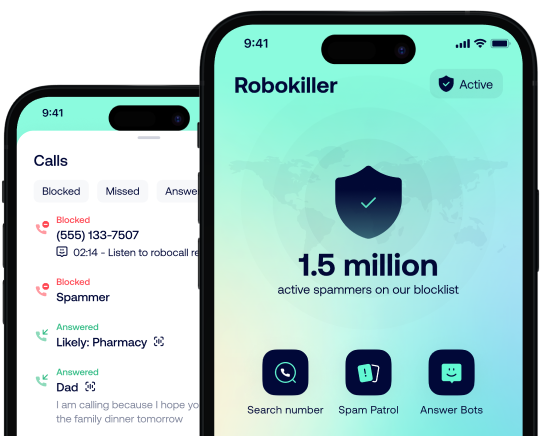Get the
Robokiller app

(877) 394-5975
Debt Collector
RoboKiller users have reported receiving spam
calls from this number
Negative
User reputation
Blocked
Robokiller status
Analytics
5 hours ago
Last call
822,371
Total calls
2,241
User reports
Reported category
Debt Collector
Learn MoreComments 31
The comments below are user submitted reports by third parties and are not endorsed by Robokiller
See more

They call at 8:30 am everyday annoying
October 2, 2025
December 22, 2023
1zqjwu'"(){}<x>:/1zqjwu;9
December 22, 2023
Carson Smithfield Collections
May 10, 2023
Medicare scam
November 3, 2022
I'm paying to have these types of calls blocked! I shouldn't be receiving them!
January 19, 2022
Creditor
December 28, 2021
Unknown number
November 16, 2021
They will call you so many times a day. Thank robokiller for freaking working amazingly to keep them for breaching me
July 23, 2021
Yes
June 11, 2021
Debt collector
April 15, 2021
Been over 7 years since put on collections
February 25, 2021
Great app
February 18, 2021
F*****s
January 6, 2021
Calls 5 times a day and doesn’t leave a message
November 4, 2020
Looking for money to pay my Bill
October 14, 2020
Always block call
October 2, 2020
Spam
September 3, 2020
Formerly Cardworks servicing
August 19, 2020
Formally Cardworks Servicing
July 31, 2020
Merrick Bank
July 13, 2020
Carson Smithfield
July 7, 2020
This is a fake phantom debt collection scam! This is what the Federal Trade Commission calls a phantom debt collection scam where the scammer pretends to be a debt collector, lawyer, or law enforcement and threatens to sue or arrest you using harassment (repeated phone calls), lies, threats, and intimidation to collect on fake debts that you do not owe. Although more than 95% of all North America phone scams originate from crowded phone rooms in India that run numerous fraud, extortion, and money laundering scams every day such as pretending to be fake pharmacies, posing as fake Microsoft, Amazon, and Apple representatives, and pretending to offer credit cards and student loan forgiveness, some of these phantom debt collection scams are committed by Americans, but many phantom debt scams also come from India scammers using text-to-speech translation software to generate a pre-recorded message without a foreign accent. Another version of these phantom debt collection scams is the frequent extortion scams perpetrated solely by Indians posing as Social Security or IRS officers threatening to sue or arrest you for fake unpaid back taxes. The scammer often mentions very vague urgent messages or legal actions, fake important documents, fake financial accounts that are unpaid, fake names of the debt collector handling your fake debts, or fake ID account codes for your fake debt, and they often falsely say "our numerous attempts to contact you at your home and workplace have been unsuccessful and this is our final attempt", which is all false and intended to make it sound urgent. The scammer then asks for your Social Security number and date of birth "for verification purposes", and either tells you that you can settle the debt by paying with a credit card or asks you for your bank account and routing number. Here is how to tell the difference between a real debt collector and a scammer: A debt collector must tell you the exact information about your debt such as the name of the creditor, the exact amount owed, and if you dispute the debt, the debt collector has to obtain verification of the debt. A scammer either avoids providing this information or provides very vague or totally false information. A real debt collector usually mentions the name of the creditor on their first phone call. A scammer tries to sound very threatening, but never gives any exact details. A debt collector has to mail you a printed-on-paper "validation letter" within five days of first contacting you. If you do not dispute the debt in writing within 30 days, the debt collector has the right to assume the debt is valid. Scammers always pressure you to settle the debt immediately, often demanding that you make a money transfer from you bank that can be untraceable; this is very common with India scammers posing as debt collectors and fake IRS officers. A scammer may threaten to tell your family and employer about your debts, but a real debt collector can only ask other people about your address, phone number, and place of employment; they cannot tell other people about your debts. Scammers will ask for your bank account and routing numbers and Social Security number, whereas real debt collectors will not. Ask the debt collector for their name, company name, street address, and a callback number, which all real debt collectors will provide. Every one of the thousands of India scammers will also immediately fail this test since all of the India scammers use spoofed fake Caller ID numbers or disposable VoIP numbers. If you suspect a scam, contact the creditor the debt collector claims to be working for and find out who has been assigned to collect the debt.
February 24, 2020
Carson Smithfield LLC
November 6, 2019
H*n
October 30, 2019
Carsafe Smith feild
August 1, 2019
I know
May 17, 2019
Don’t know
April 30, 2019
Keeps calling
April 29, 2019
Telemarketers
April 18, 2019
They buy your credit card debts which means you don’t actually owe them a d**n thing! They’re scammers in my book!
November 15, 2018